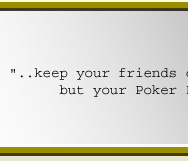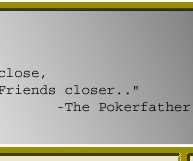The most important aspect of an online poker strategy is to understand
that the game of poker is a battle. Therefore, just like a General
who is at war needs a strategy to win the battle, a poker player
needs a poker strategy to win the poker battles. The quicker you
learn that poker is a game of skill and not of luck, the quicker
you will become a better poker player. However, please don't misunderstand
The Poker Father, it never hurts to have luck on your side (Trust
Me!). Furthermore, it is also important to understand that an
online poker strategy can be different from a real-life poker
strategy; however, the fundamentals are very similar.
Skip to:
4 Essential Skills - Deception
A good Poker Player is a someone who has mastered
the critical concepts of the game and is able to adapt their strategy
when needed. Here are four essential skills that The Pokerfather
believes all poker players must have:
1. Mathematical skills
•Good poker players know the basic percentages. Furthermore,
they know that they have about a 12.5% chance of nailing a set
when holding a pocket pair, and that they have about a 33% chance
of completing a flush draw on the flop.
•They also know how important 'outs' are.
Outs, simply put, are the number of cards that can improve your
current hand. A player should always be counting their outs by
multiply them by two and then adding one. This is a rough percentage
of hitting a better hand.
•They the ability to figure out the 'pot odds.'
Knowing outs is meaningless unless it's translated into rational,
calculated betting. If you know you have a 20% chance of hitting,
what do you do then? Well, simply once you figure out your chance
of hitting/winning, you divide the size of the pot at the river
(i.e. the current pot plus the amount of money that you think
will be added through future bets) by the amount you have to put
in. If you have a 20% chance of hitting and the bet to you is
50, if the pot at the river will be greater than 250, call. If
not, fold.
•Math skills is the most basic of poker knowledge.
It should take about a day to understand. Anyone who doesn't understand
these concepts should not play in a game until they do.
Please view our Estimate
Poker Odds Page to help your math skills.
2. Players Must Have Discipline
•Good poker players need an advantage. What will separate
a winning poker player from an average player is that the typical
player does not expect to win, while a strong player does. The
typical player just hopes to get lucky. However, the good poker
player does not "hope" to get lucky; he just "hopes"
that no one else gets lucky.
•Good poker players understand that different
games require different disciplines. More specifically, a disciplined
no limit player can be a foolish limit player and, of course,
vice versa. A disciplined limit player is always very tight on
the pre flop. They will not play too many hands, just the ones
that have a very good chance of winning.
However, a disciplined no limit player is VERY different.
This player is not so concerned with paying too many blinds; instead,
he or she does not want to get trapped. The main difference between
a disciplined limit and no limit player is that the limit player
avoids piddling away his stack bit by bit while a disciplined
no limit player avoids losing his whole stack in one hand. Hence,
a disciplined no limit player can play a lot of hands. Pre flop,
he or she can be extremely loose and limp in with hands as odd
as 35 off suit. However, a good no limit player knows when to
toss hands that will get him or her in trouble.
•A disciplined player knows when to play and
when to quit. He recognizes when he is on tilt and is aware when
a game is too juicy to just quit while ahead.
•A disciplined player keeps track of his or
her poker statistics (how much he or she wins/loses at various
games). This is because a disciplined player tries to focus on
the poker games that he or she excels at.
•A disciplined player knows that he is not
perfect. When a disciplined player makes a mistake, he learns.
He does not blame others. He does not cry. He learns from the
mistake and moves on.
3. Mental Skills
•A good player is not a self-centered player. He/She may
be a self-centered person and may also be the biggest *ss you
know. He/She may not talk about or care about anyone but him/herself
and may enjoy stealing food from the poor. However, when a poker
pro walks into a poker room, he/she always empathizes with the
opponents. He tries to think what they think and understand the
decisions they make and why they make them. The poker pro always
tries to have an answer to these questions:
I- what does my "poker friend" have
II - what does my "poker friend" think I have
III - what does my "poker friend" think I think he has
Hence: "keep your friends close, but
your Poker Friends closer"
-The Pokerfather
•Knowing the answer to these questions is
the first step, manipulating the answers is the second and more
important step. If you have a pair of kings and your foe has a
pair of aces, and you both know what each other have and both
know that you each know what the other has, why play a game of
poker? A poker pro manipulates the latter two answers by slow
playing, fast playing, and bluffing in order to throw his opponent
off.
•Good poker players know that psychology is
much, much, much more important in a no limit game than in a limit
one. Limit games often turn into math battles, while no limit
games carry a strong psychology component.
4. A Clear Concept of Risk-vs-Reward
•Pot odds and demanding an advantage fall into this category.
Poker players are willing to take a long shot risk if the reward
is high enough, but only if the expected return is worth it.
•More importantly, they understand the risk-vs-reward
nature of the game outside of the actual poker room. They know
how much bankroll they need to play, and how much money they need
in reserve to cover other expenses in life.
•Good poker players are fundamentally slightly
risk-averse. In economics, a person is defined as risk-neutral,
risk-averse, or risk-loving, depending on how that person rewards
the next dollar they gain or lose. Risk loving are perfectly happy
risking their entire roll on an even odds bet, a risk-neutral
person is indifferent towards it, and a very risk-averse person
would never risk his whole roll. Thus, a good poker player is
slightly risk averse because he demands a big enough advantage
to not be considered 'risk-neutral,' but he tends to value every
dollar on the poker table equally. If you cannot afford to lose
the entire amount of money you bring to a poker game, you should
not be playing with that much money.
(top)
Please don't think that poker is just a mathematical
based game. A good poker player will also need to posses the skill
of "Mind Games". Mind Games is an intangible asset that
all Poker Players should have. The three most important Mind Games
are Bluffing, Semi-Bluffing, and Slow playing.
1. Bluffing
Contrary to popular belief, bluffing is almost useless in a low
limit game (anything less than $2-4). Rarely will people not call
to a showdown, so there is no point in scaring people out of the
pot. I suggest waiting to bluff until you play at a higher limit.
When you play at a higher limit, it's best to bluff when you 'represent'
something and there are only one or two opponents in the pot.
For example, betting at the flop with a high card on the board
'represents' a pair, raising when a flush is possible 'represents'
the flush. Bluffing is also much more useful in a no-limit game
than a limit game.
2. Semi-Bluffing
Semi-bluffing is the same as bluffing except you possess a strong
draw. Suppose you hold As Ks and the flop is Js 3s 4d. You currently
only have ace high, but you may hit a spade flush or make a pair
of aces or kings. Thus, if you bet with this hand, you are bluffing
at the pot but have a high likelihood of possessing a strong hand
on later betting rounds. Semi-bluffing is a very useful technique
at times, especially in no-limit games.
3. Slow Playing
Slow playing means deceiving your opponents into thinking you
have less of a hand then you do. For example, suppose you hold
KK. The flop comes K33, so you flopped a full house! There is
no need to scare people out of the pot because there is little
chance of someone drawing out on you. Thus, you should wait to
the turn or maybe even river to jam the pot with bets and raises.
You should slow play if two conditions are met:
1. You hold a whopper and there is almost no chance
of someone drawing on you
2. You will only get action if some other cards
come out that will improve your opponents' hands. Nonetheless,
these cards are not good enough to make their hands beat your
hand.
(top)
Please Also See:
Poker Tips - Poker
Lessons - Tournament Tips
- Poker Rules
Poker Starting Hands - Estimating
Odds - Poker Strategy
|





